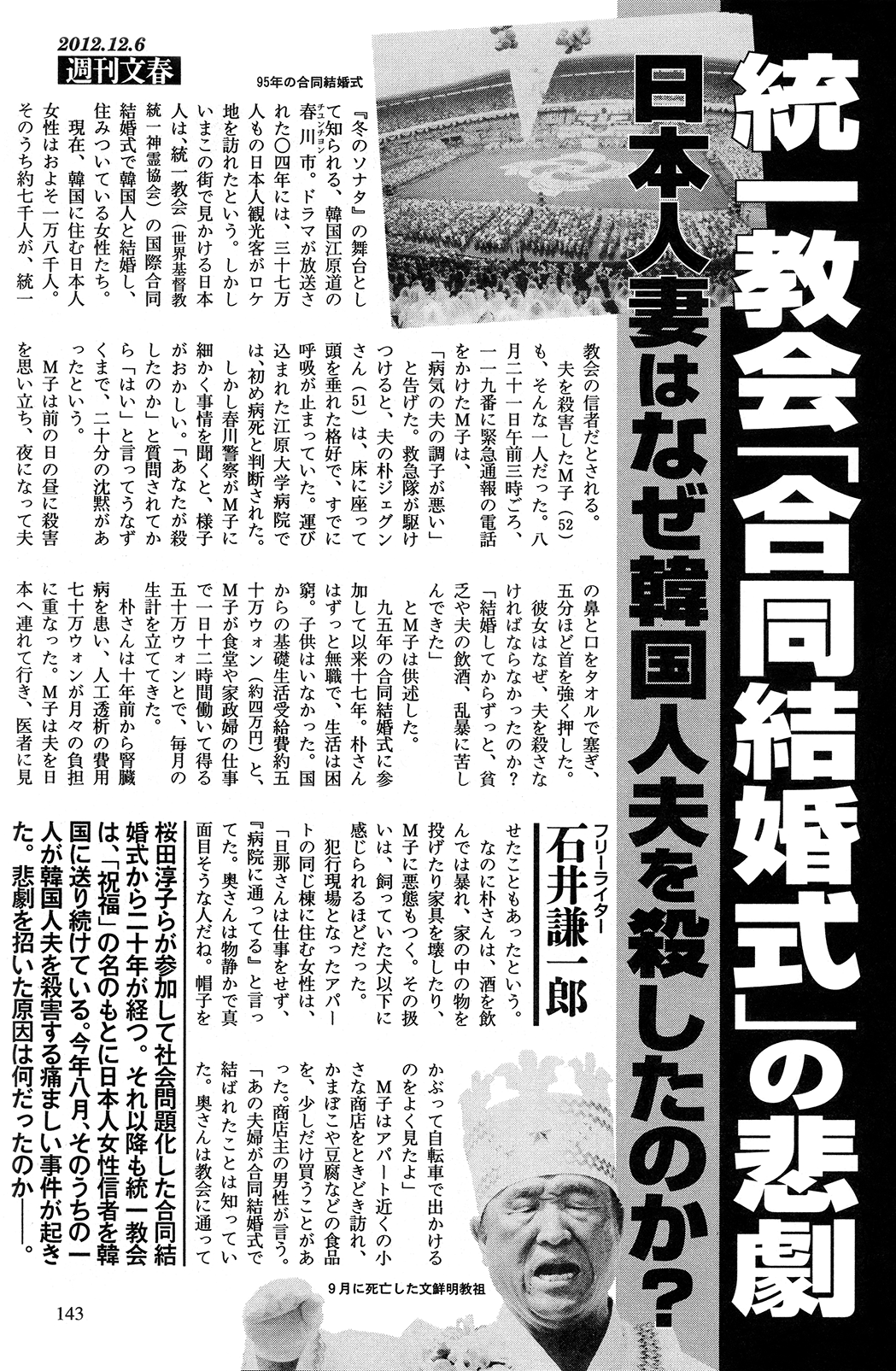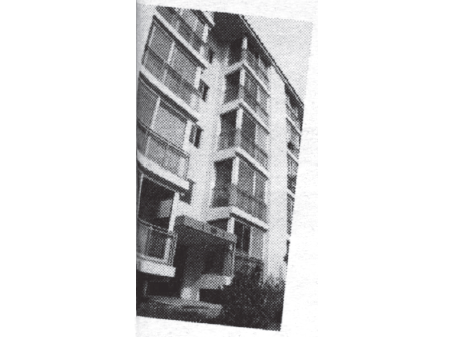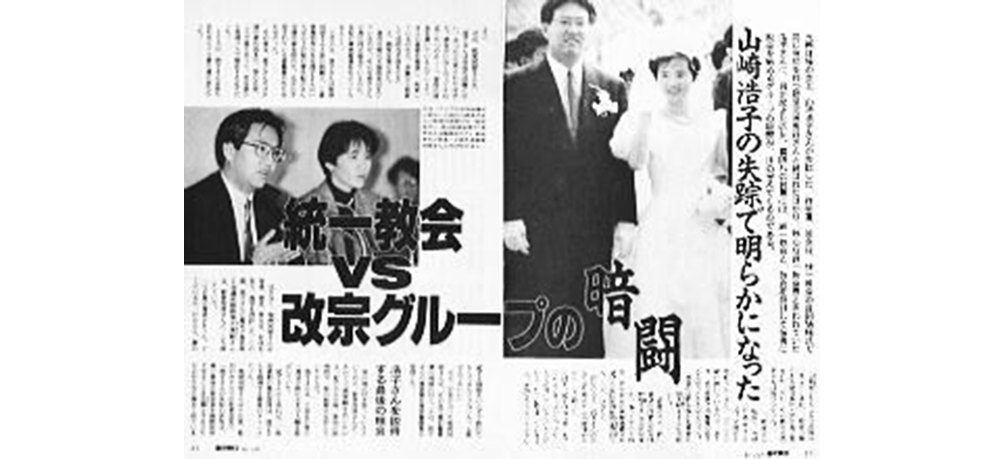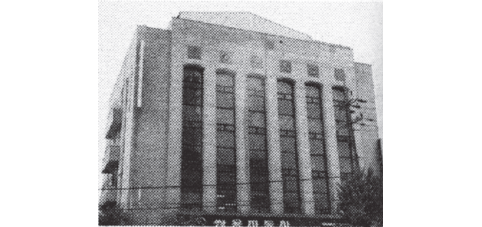Why did a Japanese Unification Church (Moon church) member kill her Korean husband?
Updated in 2018 with information about Mrs Park’s January 2013 court hearing.
Updated December 1, 2020

Top photo: Moon and Hak Ja Han conduct a mass wedding in Seoul in 1995. (Mrs Miyuki Park was married to her Korean husband there. It seems he was not a believer, but just went to the church to get a wife. He was an alcoholic who beat and abused her.) Lower photo: Reverend Sun Myung Moon who died in September 2012.
A Unification Church ‘Mass Wedding’ Tragedy
週刊文春 Shūkan Bunshun Weekly Bunshun, December 6, 2012 (p.143-145)
by freelance writer Kenichiro Ishii
[On January 29, 2013 a court sentenced 朴美雪, ボクミユキ, Miyuki Park to nine years in prison. Details below.]
Twenty years have passed since the Unification Church mass weddings have become known as a social problem. This started from the time when Junko Sakurai [from the 1970s to the 1990s she was a very well-known Japanese singer and actor] and others participated in one. Even today the Unification Church continues to send Japanese women believers to South Korea in the name of the “blessing of marriage.” In August 2012 one of those believers murdered her Korean husband in a tragic incident.
What was behind this tragedy?
The city of Chuncheon in Gangwon province is known as the setting for the famous TV drama “Winter Sonata.” In 2004, when the drama was released, three hundred and seventy thousand tourists from Japan visited the site. However, the Japanese people who now may be encountered on the streets are the women who have married Korean men through the international mass marriage ceremonies of the Unification Church (the Family Federation for World Peace and Unification or the Holy Spirit Association for the Unification of World Christianity).
Today, the number of Japanese women who live in South Korea is estimated to be about eighteen thousand. Of these about seven thousand are supposedly members of the Unification Church.
Mrs M. (aged 52), who killed her husband, was one of them. At around 3:00AM on the 21st of August she called 119 for the emergency services, saying: “My sick husband has become very ill.”
When the emergency crew arrived, her husband, Mr Jegun Park (aged 51), was dressed and sitting on the floor. His head was slumped down, and he was not breathing. At the Gangwon-Do Kangwon National University Hospital, where Mr Park was taken, his death was at first diagnosed as being caused by his illness. However, when the Chuncheon city police asked Mrs M. about the details, she acted strangely. When she was asked whether she had killed him, there was a twenty-minute silence. Then she nodded and said “yes.”
Mrs M. thought of killing her husband during the afternoon of the previous day. In the evening she had smothered her husband with a towel, which covered his nose and mouth, and had pressed on his throat for five minutes.
Why did she kill her husband? “Ever since marrying him, I have suffered – too much drinking and violence, and too little money”, Mrs M. said in her testimony.
Seventeen years have passed since she participated in the mass wedding ceremony of 1995. Mr Park was long unemployed, and they lived impoverished lives. They had no children. They had survived with the help of a national welfare-payment of about 500,000 won ($440) and the 500,000 won which Mrs M. earned. She often worked 12 hours in a day – in restaurant or housekeeper jobs. That was the monthly income they had to live on.
For ten years Mr Park had kidney disease. The cost of his monthly dialyses treatment was 700,000 won ($620), and it was a heavy burden. She even once took Mr Park to Japan to see a doctor there. Yet he kept on drinking and abusing Mrs M. When he got drunk, he swore, broke furniture, and threw things around the house. The way he treated Mrs M. was worse than the way he treated their dog.
“Mrs M. told me that her husband did not work and regularly said ‘we are going to the hospital.’ She seemed to be a quiet and serious woman. I often saw her ride her wearing a hat and riding her bicycle,” said a woman who lives in the building where the incident took place.

▲ The apartment building where Mrs M. and Mr Park lived.
From time to time Mrs M. went to a small shop near their apartment to buy food such as kamaboko (boiled fish paste) and tofu, but she only ever made small purchases, said the man who owned the shop. “I knew that the couple were married in a mass wedding. Mrs M. went to the church regularly, but I never saw her husband go. She was a good wife. She worked very hard, but her husband was exploiting her.”
Mr Park went to the same shop to buy rice wine and other alcohol. The owner advised Mr Park many times that “he should be more responsible because he has a foreign wife. He did try. But he got injured in a bike accident; it just didn’t work out. He even tried to stop drinking. But his character was weak. When there were friends drinking in the park, even as early as noon, he couldn’t ignore them and just pass by. Eventually both his body and face became swollen. It was obvious that he was ill. I’m sure he was aware of it too.” According to the owner, Mr Park’s deteriorating health was a known fact in the neighborhood. After the incident, the local women were sharing these stories with each other.
The above mentioned woman remarked “She had tolerated him for seventeen years – she just had to endure it a little longer. She didn’t have to kill him now.”
Mrs M. had stopped going to the Unification Church in Chuncheon a few months before the incident. According to the people involved with the Korean Unification Church, “Mrs M. had talked to the church many times and sought help. However, the church did not do anything. She became disappointed, and stopped going to church.” Another person involved with the church said “Mrs M. had been suffering from depression for three years. However, she did not have the money to get treatment. Around a week before the incident, her family came from Japan and tried to take her back there. However, she rejected the offer.”
The attorney appointed by the Unification Church requested a psychiatric evaluation. Therefore, Mrs M. was taken to a secure unit located in the city of Gongju, South Chungcheong Province. The results showed she had a mild adjustment disorder. It was agreed that she was mentally weak at the moment of her crime. However, she refused treatment, and was charged with murder. On November 9th, the first trial was held in Chuncheon District Court. When Mrs M. appeared in court, her face was devoid of any expression or sense of vitality. In an almost inaudible voice she admitted that she had killed her husband.
“If you become a UC follower, you can get married”
Within the sect the mass weddings are called the “Blessing.” It is taught that this is the means of being “liberated from the original sin and in the end it is the only way salvation can be achieved.” For a Japanese follower, the participation fee is a “1.4 million yen ($11,560) Blessing Donation” in addition to the actual costs. It is the largest event for the Unification Church. It is also, like other events, an event from which to make a profit. To participate in this “blessing” and to build an ideal family is the highest goal of life for the followers. To qualify for the “Blessing”, Japanese followers engage in missionary activities without giving their true identity and “inspiration businesses” using false identities.
However, for Mrs M. and Mr Park it did not result in a “blessing.” During police questioning she was asked “Do you have a religion?” Mrs M. answered “I do not have a religion now.”

▲ Hiroko Yamasaki, an Olympic gymnast, participated in 1992.
A lot of attention was given to the mass wedding of 30,000 couples in 1992 because a famous Japanese singer, Junko Sakurada, [Hiroko Yamasaki] and others participated. In 1995, in a greatly expanded mass wedding, Mrs M. was one of the 360,000 couples. This was the year the Unification Church planned an event much larger than before. In order to increase the number of participants, they recruited widely to get non-believers to join in as well. Rev Sun Myung Moon reportedly said, “Come to the Unification Church. If you do not have someone to marry, I’ll soon get you married.”
In August 1995, I was a writer for the weekly magazine Shūkan Bunshun. I saw the words “Recruiting unmarried men and women” written on a banner on the wall of the church headquarters in Seoul. This was a week before the mass wedding. In the rural outskirts of Daejeon, I talked to a thirty four year-old man who was going to participate in the wedding. I asked “why did you become a follower?” This was his frank answer: “Because I was told by the pastor of the Unification Church that if I become a believer, I can get married.” (Shūkan Bunshun August 31, 1995 issue)
Through the invitations of a sham marriage agency, men participated who not only had no faith, but did not work, had alcohol problems or a history of violence. For these reasons they had not been able to marry. Wives were chosen for them by the Reverend Moon. The brides could not to refuse because they believed he was the Lord of the Second Coming.
Here is another thing Reverend Moon said, “If you consider the possibility of not receiving a blessing at all, you should be grateful. Even if your husband has no eyes or no nose, it does not matter.”
Marriage to a Korean has great significance for the Japanese women followers of Moon. It is the highest honor for them to marry a man from the same country as Reverend Moon. In addition, the Unification Church teaches that Korea is the nation of Adam, and Japan is the nation of Eve. Eve must serve Adam. It is also necessary to atone for the “thirty-six years of colonial domination by Imperial Japan.”
The women are indoctrinated that they are “paying indemnity 蕩減 (to liquidate sin)” and so must endure any kind of hardship or suffering under any circumstances. They strive to be dutiful wives, devoted mothers and good to their husband’s parents. Nationwide there have been more than a hundred Japanese women followers who have been awarded the “孝婦賞 Woman of Filial Piety Award” or other awards by local governments, agricultural cooperatives and other organizations. This last June [2012] a member was given an award by President Lee Myung-bak himself.
A woman who married into a farming village in Korea, in the same 1995 mass wedding as Mrs M., said “To be recognized means for us that the church is being recognized. With this in mind, everyone works desperately hard.” She is no longer a follower because she became aware of the errors of the teachings. She looked down as she remarked, “I cannot take this as just another incident; it affects me as if it were my own affair.”
Shuichi Okami is an attorney who belongs to the Liaison Committee of the National Network of Lawyers Against Spiritual Sales [fortune telling fraud, etc.]. This incident, he said, reminded him of a former member who was also in the 1995 mass wedding. She met her Korean husband-to-be only two days before the wedding. After the wedding, she discovered some shocking information. “Your partner applied to participate before, but he was rejected because of his serious alcoholism. This time he was only admitted because his parents made a large donation.”
Her pure faith was completely shattered by this. With the help of her family, the woman decided to leave the church. She filed a lawsuit to get her marriage declared null and void. One winter morning in 2000, the former husband-to-be was found dead in a park. At trial the following year she won her case. So far there have been almost fifty lawsuits to prove similar marriages were not valid. In almost all cases the plaintiffs have won.
Attorney Okami continued, saying “this woman joined a group of plaintiffs who claimed that ‘during recruitment the true identity of the Unification Church was hidden and that this was illegal.’ They won this case as well.
The court confirmed their statement that ‘if you refuse a partner selected by Rev. Sun Myung Moon, you had to fear that the path to salvation for you and your ancestors is closed. You also come to worry that you may suffer illness, injury or death, and after you die you will suffer in hell. This caused [the members] substantial mental and emotional distress.’
The court ruled that ‘the formula course direction to participate in the mass weddings inhibited the freedom of marriage of the plaintiffs, and this was against the law.’
The mass weddings of the Unification Church are a serious problem.”
Hiroko Nakanishi (Religious Sociology) is a part time tutor at Kansei Gakuin University. She investigates by interviewing Japanese followers about their life in Korea, and she also analyzes the internal Japanese church newspaper entitled “Hongo People.” [Hongō 本郷 is a district of Tokyo.] Within the regular feature called “Hongo Mutual Aid Association” 本郷互助会 there is a section named “This Month’s People in Need.” Here are published descriptions of families in trouble, and the support they are asking for. The main problems they face are alcoholism of husbands, sickness, mental disorders, child and adult health issues, debts, and so on. In the June 2004 edition, the following text was published:
“My husband is an alcoholic and has not worked for the past 4-5 years. I work in a factory. However, the monthly wage of 570,000 yen is not enough to support our lives. Due to the deteriorating economic conditions, I have not been given my wages for two months now…(abridged)… I am worn out, in both body and soul. I want to escape this living hell but I cannot afford to flee, so I am seeking help from the Mutual Aid Association.
<Aid Given> 20kg of rice for 6 months, employment finding services.” Other examples included “Gift of five hundred thousand won”, “One hundred thousand won loan.” It is not clear how much help this assistance was for the people.
Ms. Nakanishi said, “I think there are more than a few people who are suffering in similar circumstances to those of Mrs M. Although she was the aggressor in the incident, in a sense Mrs M. was also a victim of the mass weddings.”

▲ The church in Chuncheon which Mrs M. attended.
Did Mrs M. ask for help? When we asked the Public Relations Department of the Unification Church of Japan, they gave this answer: “Perhaps because she did not want to cause trouble, she did not ask for help or consult us. Instead, friends belonging to the local church approached the ‘Hongo Mutual Aid Association’ on her behalf. They were doing their best to arrange for counseling visits at her home, provision of food, and support for living costs.”
In addition, I asked them if a match between a Japanese woman with sincere faith and a Korean man without any faith at all did not contradict their so-called ‘blessing.’
They replied “what is wonderful about the marriages of the Unification Church is the sharing of common values. The husband and wife place God at the center of their lives, and strive to live for each other. They seek to become ideal couples and, through their mutual support, to build an ideal family.”
However, couples like Mrs M. and Mr Park did not “share common values.” If the Unification Church continues to mass produce similar couples, more problems will naturally arise. The existence of a ‘Hongo Mutual Aid Association’ proves this very fact.
As many as four hundred million couples involved in mass weddings?
After the three hundred and sixty thousand couples’ mass wedding in 1995, the numbers have been reported as 40 million couples, 360 million couples, and 400 million couples. The mass weddings have been taking place almost every year since then.
How did they recruit so many million participants? The Unification Church made a dummy organization. Behind this façade they ran a campaign called “Chastity Education” and produced “Chastity candy” [“Holy candy”]. They distributed these Chastity candies in kindergartens, elementary and middle schools for free in Korea. In Japan, they handed them out them on the streets. Quite amazingly, every person who accepted this candy was counted as a participant.
Without having solved the numerous problems of the Unification Church, Rev Sun Myung Moon died on September 3rd 2012. He was 92 years old. The thirty two thousand Japanese followers of Moon were requested to visit Korea with condolences, each paying 120,000 yen ($1000). Just this amounts to 3.8 billion yen ($31,400,000). Even after the death of Rev Moon, the Church’s profit-first nature remains utterly the same.
Miyuki Park was sentenced to nine years in prison.
Regarding the remarks of the presiding judge at the judgment hearing of the trial at the Chuncheon District Court on January 29, I will quote the Japanese translation made by Mr. Seung-min Park who was there in person.
January 29, 2013
High Court No. 238, 2012 Defendant 朴美雪 ボクミユキ Miyuki Park
(known as Mrs Boku Miyuki in Japan.)
The presiding judge addressed the defendant, Miyuki Park.
“You can understand what I am saying, right? In the earlier trial proceedings there was an interpreter. For today’s sentencing, I will speak slowly because the interpreter has not yet arrived in the courtroom. The defendant is a Japanese national, but evidently understands Korean to some extent. Therefore, the sentencing will be given in Korean without an interpreter. According to the prosecution evidence which has been lawfully considered, the court can conclude that there is sufficient for the accused to be charged with the murder.
The presiding judge addressed the defendant by name, “Defendant Miyuki Park! According to the evidence, the court can conclude that the accused is to be charged with the murder. Do you understand? I will explain the reasons for the penalty for the murder for which the accused is found guilty.
“In this case the victim (the husband of the accused) was in a state of poor health, suffering the aftermath of a cerebral hemorrhage and chronic renal (kidney) failure and was unable to resist. He was killed while he was sleeping. The defendant killed her husband, but as a spouse was obliged to support and protect him. The circumstances of this crime are serious. According to the crime report, 50 minutes after killing the victim, the accused called 119 for the ambulance instead of 112 for the police. Even after arriving at the hospital the behavior was bad, as she explained to the doctor that the victim was unable to receive dialysis for several days, and his condition had worsened and he had died.
“The husband had frequently ranted and insulted the defendant, but it is difficult to see a pattern of the accused being punished through domestic violence. The defendant could have gotten out of this situation in which she found herself through other ways besides choosing the extreme course of murder.
“Also taking into account that the victim’s father wants a severe punishment to be given to the accused, a heavy sentence for the accused is inevitable.
“However, there are some points to favor leniency. The defendant was married to the victim after they met through the Unification Church, also she was married to a foreigner. The defendant supported the victim who was suffering from chronic renal failure. The defendant suffered from adjustment disorder and from persistent depression. It seems that due to this, the defendant seems to have suffered from poor mental and physical health. Following all this, she committed the crime.
“Leniency should be considered since the defendant is a first-time offender with no prior history of any criminal offense. We have decided the judgment as follows by applying the criteria for sentencing by the Supreme Court.
“The defendant shall be punished by imprisonment for not more than nine years. I will confiscate the towel which was seized. Defendant Miyuki Park, do you understand the sentence that has been pronounced?”
[Defendant Miyuki Park replied,] “I was sentenced to nine years in prison.”
or possibly
[Presiding judge:] “You have been sentenced to nine years in prison.”
It is not clear from the Japanese text which of the two said this.
“If you are dissatisfied with this decision and want to appeal, you can do so. The appeals form can be submitted within seven days from today to the Director (the Prison Director). It will then be sent by the Chuncheon Court to the (appeals court at the) Seoul High Court.
“Defendant Miyuki Park, is there anything you do not understand about the decision? Do you understand about the appeal process? Is there any part for which you need further explanation?”
Miyuki Park spoke in a very quiet voice which the presiding judge could not hear. The prosecutor, who was close by, heard what Miyuki Park had said, and conveyed it to the Chief Justice. It seems that Miyuki Park requested the contents of the ruling in writing.
The presiding judge said, “Yes, you will receive the ruling in writing. Because the accused is on detention, the details of the proceedings including today’s sentence will be written in detail and sent to you. Do you wish to say anything else? …I will now conclude the sentencing hearing.”
日本人妻はなぜ韓国人夫を殺したのか?
統一教会「合同結婚式」の悲劇
“Apology marriages” made by Japanese UC members to Korean men.
Japanese 20-year-old woman recruited by the UC, and then sold to an older Korean farmer
Japanese member, Ms. U, was married to a Korean man who beat her
Japanese member, Ms. K, was forced to marry Korean man she did not like
Hiroko Yamasaki (Olympic athlete) joined and left the Moon church
Yuka Nakamura, a Unification Church member in Korea, recently took her own life
